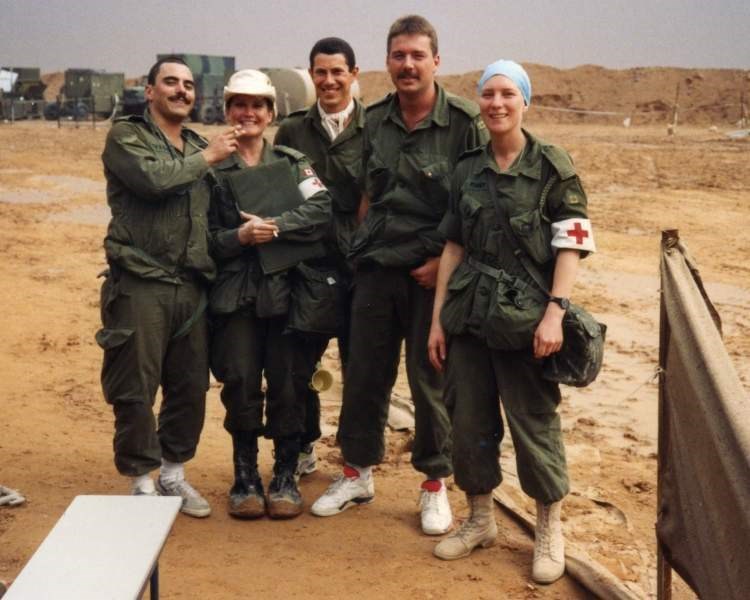While serving in the first Gulf War Olds resident Leslie Manchur never knew whether she'd been hit by chemical or biological weapons or not.
They're colourless and odourless.
“I remember many times while serving in the desert we would have alarms go off and we would have to don our full MBCW (medical, biological, chemical weapons) gear as quickly as possible,” Manchur says.
“I would lie there under canvas – because we had no other shelter – for quite a long time wondering, ‘have I been hit now? Is this my time?'”
Manchur served with the One Field Ambulance Calgary as a medic during the first Gulf War, which lasted from Aug. 2, 1990 to Feb. 28, 1991. She was 34 at the time.
They set up a forward surgical hospital (a large MASH-type unit) in the desert about 80 kilometres from the front line. A British field hospital was attached to it as well.
“Basically I was one of the medics who would be at the front lines – trained to keep them alive, evacuate them (if necessary),” she says.
Armed Forces personnel in the Gulf War were injected with different viruses so their bodies could build up immunity to various diseases.
“I was injected with anthrax, botulism, plague, and took the anti-nerve-agent tablets. Also received the flu shot – just joking,” Manchur says.
Possible medical, chemical or biological contamination was not the only worry.
“The other fear was we were in the line of fire for Scud missiles which were (flying) overhead of us,” she says. “We saw some of the lights and saw some of the action; we heard it.”
Yet another concern was the possibility that their patients could turn on them and attack them.
That's because the vast majority of their patients were Iraqi soldiers. Manchur says security personnel thoroughly searched those patients when they first came into camp because grenades had been taken into some U.S. facilities.
Another problem Manchur and her colleagues endured was oil – from the sky.
She says oil rained down as a result of oil facilities that had been destroyed during the war.
“I never thought that Canada would be going to another war. Canada has always been involved in peacekeeping missions since the First and Second wars and the Korean War,” Manchur says.
“I guess it really hit home to me – or made me realize that this was not a drill or an exercise – when I was in a Hercules aircraft flying into Saudi Arabia and the loadmasters and crew were unpacking wooden crates of weapons and loading them before we landed.”
All told, Manchur served the Armed Forces for 22 years and has been living in Olds for about 20 years
In addition to the first Gulf War, Manchur also served with the North Atlantic Treaty Organization (NATO) in Germany, Canadian Forces Base Comox and One Field Ambulance Calgary, where, as a sergeant, she was in charge of an evacuation platoon.
She was also an instructor at the Canadian Forces Medical Services School in CFB Camp Borden, Ont. for four years.
Manchur was 19 when she joined the Canadian Armed Forces, following the tradition of her father and grandfather, who also served in the military.
Ironically, she says, some of her field ambulance training way up in Baffin Island helped prepare her for the desert during the Gulf War.
That training involved “getting used to the elements and the surroundings and what comes with that territory or any territory that you're in,” she says. “It makes you stronger, prepares you better.”
Despite the dangers and risks, Manchur says she was never afraid to do her job.
“That was my duty,” she says.
“Who would like to be in the middle of the desert in unknown territory, in unknown circumstances? But I served my country proudly and I believe that all soldiers who have served – or who are serving – do a terrific job to the best of their ability and we should be proud (of them).”



